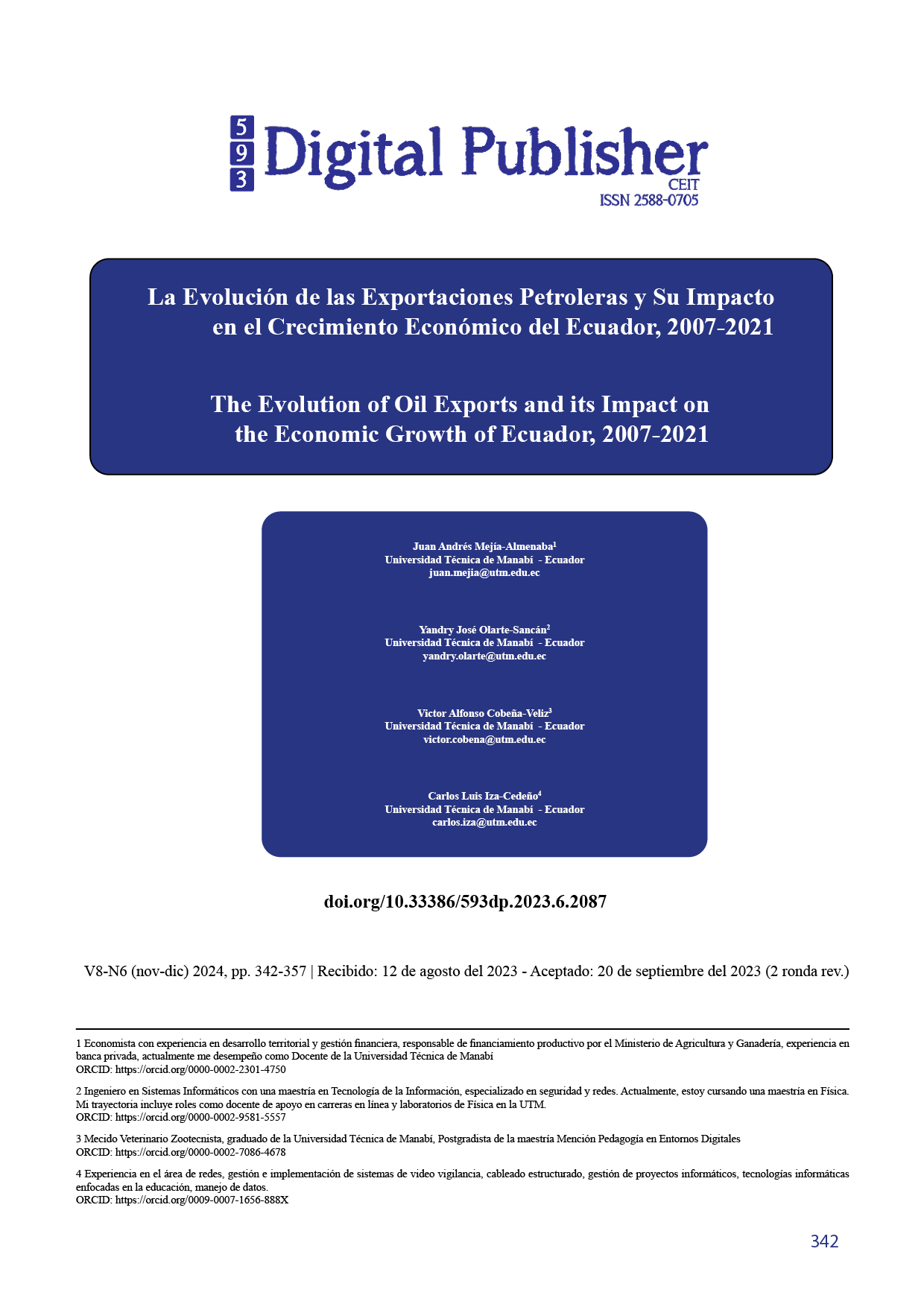The Evolution of Oil Exports and its Impact on the Economic Growth of Ecuador, 2007-2021
Main Article Content
Abstract
This scientific article analyzes the evolution of oil exports in Ecuador and its impact on the country's economic growth over the past decades, with a particular focus on the years under study. Oil has become a crucial source of income for the Ecuadorian economy, and its impact on the country's development is a subject of debate and study. The article begins with a historical review of the evolution of oil exports since 1970, which marked the beginning of the well-known oil boom in the country. It highlights the factors that have influenced oil exports during the study period.
Subsequently, the study focuses on the relationship between exports and economic growth in Ecuador, using relevant economic and statistical data to assess the correlation between the study variables. Secondary data were obtained from national and international institutional databases related to the oil industry. The main results obtained from the stylized facts indicate that the variation in oil exports during the study period was 3%, with exports totaling $8,328.44 billion in the base year and $8,607.25 billion in the final year of the time series. Furthermore, the price of WTI crude oil increased by 4% during the same period, rising from $59.86 US dollars in the base year to $61.97 in the final year of the period.
Finally, in the econometric analysis conducted, a determination coefficient of 67% was obtained, indicating that 67% of the variability in Ecuador's economic growth is explained by oil exports, oil prices, and gross fixed capital formation. These results support the study's hypothesis that oil exports have a significant impact on the country's economic growth.
Downloads
Article Details

This work is licensed under a Creative Commons Attribution-NonCommercial-ShareAlike 4.0 International License.
1. Derechos de autor
Las obras que se publican en 593 Digital Publisher CEIT están sujetas a los siguientes términos:
1.1. 593 Digital Publisher CEIT, conserva los derechos patrimoniales (copyright) de las obras publicadas, favorece y permite la reutilización de las mismas bajo la licencia Licencia Creative Commons 4.0 de Reconocimiento-NoComercial-CompartirIgual 4.0, por lo cual se pueden copiar, usar, difundir, transmitir y exponer públicamente, siempre que:
1.1.a. Se cite la autoría y fuente original de su publicación (revista, editorial, URL).
1.1.b. No se usen para fines comerciales u onerosos.
1.1.c. Se mencione la existencia y especificaciones de esta licencia de uso.
References
Ackah, I. (2016). The exploration and production life cycle of oil and gas. Reporting oil and Gas. https://doi.org/reportingoilandgas.org
Aguas, R. (2016). El Petróleo: Efecto social y económico en el Ecuador. Journal of Science and Rearch , 29-32.
Andrade, J. (2012). Importancia de las exportaciones petroleras en la estructura económica ecuatoriana 2003-2009. Universidad Técnica Particular de Loja.
Artola, V., y Pazmiño, M. (2007). Análisis de los fondos petroleros en el Ecuador. Apuntes de economía, 53(1), 1-31.
Banco Central del Ecuador. (2022). Exportaciones Petroleras Sector Externo. Banco Central del Ecuador.
Bejarano, H., Ochoa, G., Jaya, I., y Jurado, C. (2017). La volatilidad del precio del petróleo y sus efectos en la economía ecuatoriana en la última decada. II Congreso Internacional de Ciencia y Tecnología.
Benavides, C., Reinoso, M., y Estevez , E. (2017). La influencia de los productos petroleros y no petroleros en la balanza comercial del Ecuador. Revista Publicando , 379 - 397.
Bridgman, B. (2008). Energy Prices and the Expansion of World Trade. Review of Economic Dynamics, 11(4), 904-916. https://doi.org/10.1016/j.red.2008.07.006
Cepeda, P., Zurita, E., y Ayaviri, D. (2016). Los Ingresos petroleros y el crecimiento económico en Ecuador 200-2015. Investig Atloandin, 459-466.
Colmenares, F. (2008). Petróleo y crecimiento económico en México 1938-2006. Economia UNAM, 53-65.
Chen, S.-S., & Hsu, K.-W. (2012). Reverse globalization: Does high oil price volatility discourage international trade? Energy Economics, 34(5), 1634-1643. https://doi.org/10.1016/j.eneco.2012.01.005
Epaphra, M., & Massawe, J. (2016). Investment and Economic Growth: An Empirical Analysis for Tanzania. Turkish Economic Review, 3(4), 1-31. https://doi.org/http://dx.doi.org/10.1453/ter.v3i4.1019
Fontinelle, A. (15 de abril de 2019). Positive vs Normative Economics: What´s the difference? ttps://www.investopedia.com/ask/answers/12/difference-between-positivenormative-economics.asp
Freire , L., y Carrión, Á. (2020). Las exportaciones petroleras del Ecuador y su incidencia en el crecimiento económico. UTA, 3(1), 44.
Galindo, M., y Viridiana, R. (2015). Exportaciones en Serie de Exportaciones. Scholar Harvard, 1. https://doi.org/http://scholar.harvard.edu/files/vrios/files/201507_mexicoexports.pdf?m=145
Garcia, M. (2014). El sector petrolero en el Ecuador 2000-2010. Problemas del Desarrollo, 113-139.
Gonzáles, K., y Vanegas, K. (2019). Efecto de los ingresos por exportaciones petroleras ecuatorianas en el crecimiento económico del país periodo 2000-2016. Universidad del Azuay, 8-22. https://doi.org/http://dspace.uazuay.edu.ec/handle/datos/8946
Gujarati, D., y Porter, D. (2009). Econometría. MC Graw Hill. https://doi.org/ISBN: 978-607-15-0294-0
Hérnandez, G. (2018). Exportaciones petroleras y su incidencia en los sectores industriales. FCE, 4, 6-12.
Hernández, L. (2006). La renta petrolera y su impacto en el crecimiento económico de Venezuela. Revista Latinoamericana de Economía, 135-151.
Ibarra, D. (2013). El modelo de crecimiento económico Solow-swan aplicado a la contaminación y su reciclaje. Ciencias Forestales, 12.
Jurado, C., Bejarano, H., Salcedo, V., y Sánchez, M. (2017). La volatilidad del precio del petróleo: sus efectos en la economía ecuatoriana en la última década. 3C Empresa, 4(2), 33-45.
Kunts, R. (2006). Introduction to Macroeconomics. Universität Wien.
Macancela, M., y Teran, A. (2014). El impacto de los precios del petróleo sobre el crecimiento de la economía ecuatoriana 1972- 2012. Universidad de Cuenca.
Mayorga, J., y Martínez, C. (2008). Paul Krugman y un nuevo comercio internacional. Criterio libre, 8(5), 73-86.
Odularu, G. (2008). Crude Oil and the Nigerian Economic Performance. Oil and Gas Business, 1-29.
OECD. (2007). Growth. Building jobs and prosperity in developing countries. . Departament for International development.
Organización Mundial del Comercio. (2013). Informa sobre el comercio Mundial. WTO.
Organización Mundial del Comercio. (2013). Informe sobre el comercio munidal. WTO.
Pacheco, M. (19 de Junio de 2019). La producción de crudo subió hasta abril de este 2019 en Ecuador. El Comercio, pág. 25.
Perilla, J. (2007). El impacto de los precios del petróleo sobre el crecimiento económco. Revista de Economía del Rosario, 75-116.
PetroEcuadorEP. (2018). El Petróleo en el Ecuador la nueva era Petrolera. Coordinación General de Imagen Empresarial EP Petroecuador.
Samuelson, P., y Nordhaus, W. (2010). Macroeconomía con aplicaciones a Latinoamérica. McGraw Hill.
Schliesser, R., y Silva, J. (2000). La renta petrolera y el crecimiento económico de Venezuela : análisis del período 1913 - 1995. Revista BCV, 14(1), 61-102. https://doi.org/ ISSN 0005-4720, ZDB-ID 2033005-4
Soto, V. (2017). Hechos estilizados del crecimiento económico de Mexito. Coahuila: UAC-Mexico.
Sotoudeh, M.-A., y Worthington, A. (2016). Estimating the effects of global oil market shocks on Australian merchandise trade. Economic Analysis and Policy, 50, 74-84. https://doi.org/https://doi.org/10.1016/j.eap.2016.02.006
Surbi, S. (2017). Difference between Positive and Normative Economics. https://keydifferences.com/difference-between-positive-and-normativeeconomics.html
Yanfeng, W. (2019). Oil price shocks, economic policy uncertainty and China’s trade: A quantitative structural analysis. The North American Journal of Economics and Finance, 48, 20-31. https://doi.org/https://doi.org/10.1016/j.najef.2018.08.016





